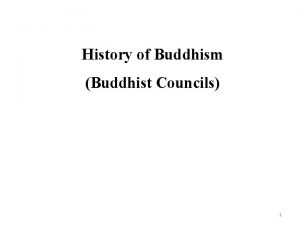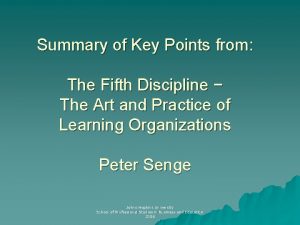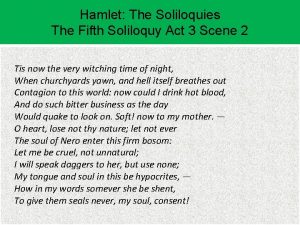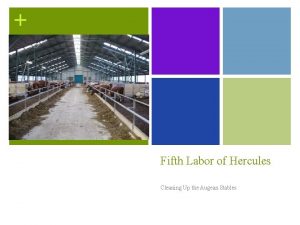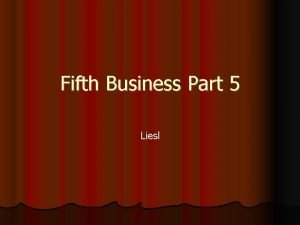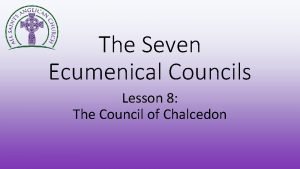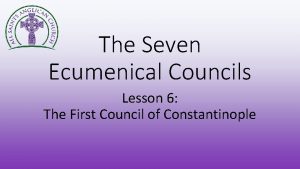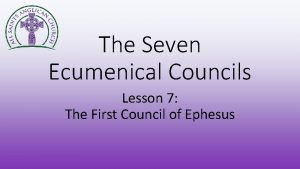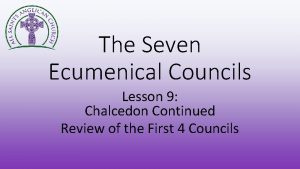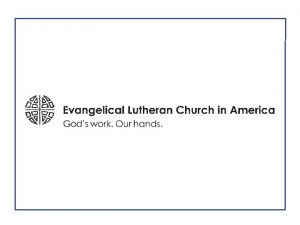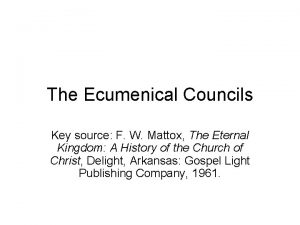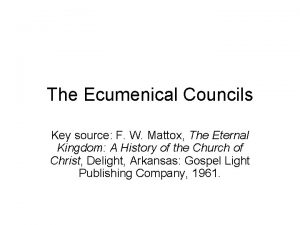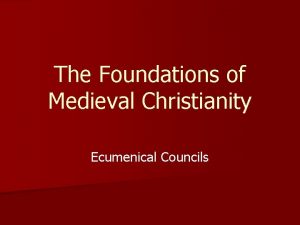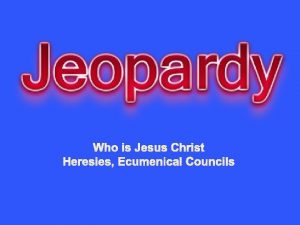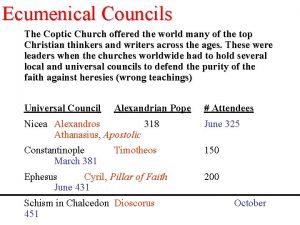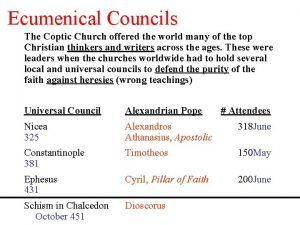The Seven Ecumenical Councils Lesson 10 The Fifth
















- Slides: 16

The Seven Ecumenical Councils Lesson 10: The Fifth Ecumenical Council Constantinople II

Background to the Council

Background to the Council • Lingering Debates over Chalcedon in Egypt and Syria • Growing resentment of Constantinople’s government power in Egypt and Syria • Emperor Zeno’s Annulment of Chalcedon in 476 • Emperor: Everyone go back to the way things were before! • Pope Felix III: Emperors don’t have authority over belief • Schism between Constantinople and Rome until 519

Background to the Council • Justinian the Great • Crowned in 527 • Considered it his duty to have an empire that was united politically and doctrinally • Decreed all bishops must subscribe to Chalcedon • But promised another Council to work out differences

Background to the Council • Justinian promoted the ideas of Leontius of Byzantium • Defended Chalcedon against various heresies • Proposed a compromise idea: enhypostasia of the human nature of Christ in the divine Logos • Might satisfy both Alexandrian and Antiochene moderates

Leontius’ Enhypostasis

Enhypostasis • If, as all agree, a “nature” must have its own hypostasis (i. e. “personal existence”), how can one confess “two natures in one hypostasis”? – Core of the Debate • Agreed with the Alexandrians that the eternal Logos/Word, God the Son, is the subject of the incarnation. I. e. , the “personality” of Jesus is God the Son.

Enhypostasis • Disagreed with the Alexandrians that the humanity of Christ is impersonal (Cyril had called this the anhypostasia of the human nature) • Why? A nature without a hypostasis would be an abstraction, a mere idea.

Enhypostasis • Does this then imply that there must be two persons/hypostases? Each nature has its own personhood? • No. While each nature needs a personhood, it need not have its own personhood. • I. e. , it can be “hypostatized” in another.

Enhypostasis • The human nature of Christ was not without hypostasis, but became hypostatic in the Person of the Logos. • The human nature of Christ was not anhypostatic (impersonal), nor personal in itself, but enhypostatic, “personalized in the person of another”

Enhypostasis • Three ways in which two beings may be united: • 1) Close relationship, such as friendship or marriage • Nestorianism: Two natures, two persons. • 2) Blended into a third thing or hybrid • Monophysitism: One hybrid nature, one person • 3) United so that their distinct natures subsist in a single hypostasis – Incarnation of Christ • Like a flame and wood united by fire in a torch

Enhypostasis • Therefore, Jesus’ human nature is exactly like unfallen humanity • But no independent existence apart from the Divine Logos • I. e. , Jesus was and is and always will be the Second Person of the Trinity • The Divine Person assumed a human nature, joining it with his divine nature forevermore.

The Second Council of Constantinople

Constantinople II, 553 • May 5 – June 2, 553 • Called by Emperor Justinian the Great • Presided by Eutychius, Patriarch of Constantinople • Other Three Eastern Patriarchs also Present • Pope Vigilius refused to attend and issued a document forbidding them from proceeding without him • 152 Bishops attended (only 16 from the West)

Constantinople II, 553 • Promoted/explained Leontius’ views as a clarification of Chalcedon’s rulings • Also Condemned the “Three Chapters” • Theodore of Mopsuestia, 350 -428 • Some of Theodoret of Cyrus’ writings, 393 -458 • Letter of Ibas of Edessa to Maris, 435 -457 • All three Antiochene, and long dead! • Condemned Origen, 184 -253, an Alexandrian

Constantinople II, 553 • Ultimately failed to bring the non-Chalcedonians back • (Busy defending against Islamic invasion) • Mostly an Eastern Issue, though the Roman Church accepts it • ACNA: affirms the “Christological clarifications” • Many Protestants can’t follow the issues, nor really care!
 Ecumenical advocacy alliance
Ecumenical advocacy alliance 2nd buddhist council
2nd buddhist council Derbyshire association of local councils
Derbyshire association of local councils Sa councils
Sa councils Best practices of catholic pastoral and finance councils
Best practices of catholic pastoral and finance councils India council act 1861
India council act 1861 Customer councils
Customer councils Evagrius ponticus seven deadly sins
Evagrius ponticus seven deadly sins Madelyn hunter
Madelyn hunter The fifth discipline summary
The fifth discipline summary Korotkoff sounds
Korotkoff sounds Fifth gear loop the loop
Fifth gear loop the loop Fifth paragraph of the ffa creed
Fifth paragraph of the ffa creed Fifth soliloquy of hamlet
Fifth soliloquy of hamlet Fifth standard solar
Fifth standard solar Fifth labor of hercules
Fifth labor of hercules Liesl fifth business
Liesl fifth business

